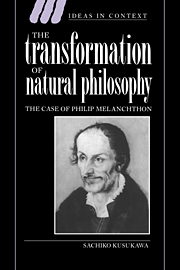Book contents
- Frontmatter
- Contents
- List of illustrations
- Notes on the text
- Acknowledgements
- Introduction
- 1 The way of the Schoolmen
- 2 Law and Gospel: the reforms of Luther and Melanchthon
- 3 The soul
- 4 The Providence of God
- 5 The construction of orthodoxy
- Conclusion: a transformation of natural philosophy
- Bibliography
- Index
- IDEAS IN CONTEXT
5 - The construction of orthodoxy
Published online by Cambridge University Press: 06 November 2009
- Frontmatter
- Contents
- List of illustrations
- Notes on the text
- Acknowledgements
- Introduction
- 1 The way of the Schoolmen
- 2 Law and Gospel: the reforms of Luther and Melanchthon
- 3 The soul
- 4 The Providence of God
- 5 The construction of orthodoxy
- Conclusion: a transformation of natural philosophy
- Bibliography
- Index
- IDEAS IN CONTEXT
Summary
FAUSTUS: Think, Faustus, upon God, that made the world.
Christopher Marlowe, Doctor Faustus vi. 76Melanchthon's works on philosophy set the trend of sixteenth century ‘textbooks’. Instead of staying close to Aristotle's order of argument, Melanchthon followed a list of loci, selected and ordered with didactic clarity in mind. The list did not necessarily cover all the problems or arguments in Aristotle and it also included topics which were alien to Aristotle. Instead of trying to resolve exhaustively by way of logical reasoning (as in the quaestio method), Melanchthon proceeded by loci: each section began with a question such as ‘Quid est physica?’, ‘Quid est anima?’ and ‘Quid est mundus?’ followed by a direct and clear answer. Classical and contemporary authors were cited primarily in order to endorse these answers. No attempt was made on Melanchthon's part to reconcile differences among authorities or to follow a single classical author. This was perhaps due to his recognition that most classical authors have erred in one way or another and that human knowledge was always fallible. Melanchthon simply selected what was useful for his purposes.
It was not simply for didactic purposes that the loci were arranged in a certain way but, as I have argued, it was mainly in order to facilitate demonstration of the Providence of God in the physical world. Strikingly, Melanchthon never explained how and why certain loci were selected and ordered in the particular way that they were. Even in his dialectics textbooks where he explains the finding part of the loci, Melanchthon is reticent about the order or choice of appropriate topics. His textbooks proceeded through a list of loci in a simple question-and-answer form, without any explanation or discussion of the underlying principle of the order of the list.
- Type
- Chapter
- Information
- The Transformation of Natural PhilosophyThe Case of Philip Melanchthon, pp. 174 - 200Publisher: Cambridge University PressPrint publication year: 1995



